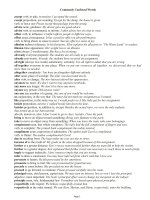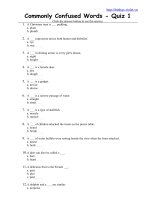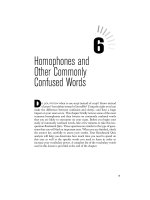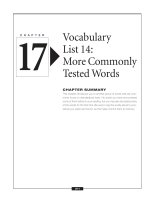Commonly Confused Words
Bạn đang xem bản rút gọn của tài liệu. Xem và tải ngay bản đầy đủ của tài liệu tại đây (78.81 KB, 2 trang )
Commonly Confused Words
accept verb, to take, to receive: I accepted the award.
except preposition, not counting: Except for the damp, the house is great.
verb, to leave out: Please except that package from the group.
advice noun, guidance: My doctor gave me good advice.
advise verb, to recommend, to inform: I often advise her on what to wear.
affect verb, to influence: Conflict affects people in different ways.
effect noun, consequence: It has a positive effect on job performance.
verb, to bring about, to cause to occur: Success effects a sense of joy.
allusion indirect reference: In his footnotes, Eliot explains the allusions in “The Waste Land” to readers.
illusion false appearance: Her weight loss is an illusion
a lot (always 2 words) many: She has a lot of energy.
all ready everyone prepared: The students are all ready to go swimming.
already previously: Already, the students have received an assignment.
all right (always two words) satisfactory, certainly: It is all right to admit that you are wrong.
all together everyone in one place: When we put our resources all together, we discovered that we had more
than we needed.
altogether completely: You have an altogether different attitude.
altar noun, place of worship: The altar was decorated nicely.
alter verb, to change: The new haircut altered her appearance.
anymore no more: We don’t want to buy anymore textbooks.
any more any longer: We don’t live there any more.
anyone any person: Did anyone come?
any one any member of a group: Any one of you would be welcome.
as conjunction, in the way that: The tutor did not mark my assignment as I wanted.
like preposition, in the same way as: I would prefer an A like Julie got for her assignment.
beside preposition, next to: I walked beside him down the lane.
besides preposition, in addition to, except: Besides the actual tutor, we were the only students
that turned up at our 8am tutorial.
adverb, moreover, also: I don’t want to go to class; besides, I love the park.
bring to move an object toward something: Bring your flatmate to the party.
take to move an object away from something: When you leave the train, take your belongings.
complement noun, that which completes: The baby had the full complement of fingers and toes.
verb, to complete: The printed book complements the online tutorial.
compliment noun, expression of admiration: The author paid Carol a compliment.
verb, to flatter: The author complimented Carol.
due to resulting from: The bags under my eyes are due to stress.
because of as the result of: My grade in the class dropped because of this assignment.
farther at a greater distance: Ken’s rescue team traveled farther than my team did to help the victims.
further to a greater degree: Ken explained that further travel was necessary to reach those in need of help.
imply to suggest indirectly: I don’t mean to imply that you are wrong.
infer to draw a conclusion: You may have inferred from what I said that I love you.
persecute to harass: He felt persecuted by her attentions.
prosecute to bring to trial: She was prosecuted for grand larceny.
precede to come before: She preceded me into the house.
proceed to go forward, to continue: Please proceed carefully into the room.
principal noun, chief person, capital sum: We may earn no interest, but we won’t lose the principal.
adjective, most important: The book’s principal effect was to change my viewpoint on the subject.
principle noun, rule, fundamental law: Tornadoes are based upon physical principles.
respectfully with respect: We behave respectfully around him.
respectively in the order named: We saw Kurt, Marian, and Diane, respectively, enter the building.
some time adjective & noun, span of time: We have some time before the test begins.
Page 1
sometime adverb, at an unspecified time: I will probably feel nervous about it sometime soon.
sometimes adverb, now and then, occasionally: Sometimes I’m funny that way.
stationary adjective, not moving: When the wind died, the boat was stationary.
stationery noun, letter paper: The woman wrote on her stationery to her friend.
than conjunction, used in comparisons; Cycling was easier than walking
then adverb, at that time, besides: Then I fell off my bike.
your pronoun: belonging to you: Your cleverness amazes me.
you’re contraction for you are: You’re a clever person.
Page 2


![[TieuBaoan] Confused Words...Những từ gây nhầm lẫn](https://media.store123doc.com/images/document/13/gu/nh/medium_PdPy5OdVli.jpg)
![[TieuBaoan] Confused Words Exercises](https://media.store123doc.com/images/document/13/gu/wh/medium_NzdqaElDMt.jpg)





